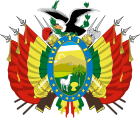 |
|---|
A referendum on natural gas reserves was held in Bolivia on 18 July 2004. [1] Voters were asked five questions on the government's policy on natural gas, with all five approved. [2]
 |
|---|
A referendum on natural gas reserves was held in Bolivia on 18 July 2004. [1] Voters were asked five questions on the government's policy on natural gas, with all five approved. [2]
Holding a referendum on the use of the country's gas reserves was one of the first promises made by President Carlos Mesa upon assuming the presidency in the aftermath of the Bolivian Gas War of October 2003 that saw his predecessor, Gonzalo Sánchez de Lozada, forced to resign and to flee the country.
The referendum was largely intended to quell the political unrest seen during the Gas War. Fears of an uprising led the Bolivian government to take measures essentially forcing the population to vote (announcing fines and other penalties for those who refused or boycotted) and warned that protesters against the referendum would be imprisoned.
Do you agree that the Hydrocarbons Law (No. 1689), enacted by Gonzalo Sánchez de Lozada, should be repealed?
| Choice | Votes | % |
|---|---|---|
| For | 1,788,694 | 86.6 |
| Against | 275,742 | 13.4 |
| Invalid/blank votes | 614,082 | – |
| Total | 2,678,518 | 100 |
| Registered voters/turnout | 4,458,293 | 60.1 |
| Source: Nohlen | ||
Do you agree that the Bolivian State should recover ownership over all hydrocarbons at the wellhead?
| Choice | Votes | % |
|---|---|---|
| For | 1,913,642 | 92.2 |
| Against | 162,130 | 7.8 |
| Invalid/blank votes | 594,359 | – |
| Total | 2,678,518 | 100 |
| Registered voters/turnout | 4,458,293 | 60.1 |
| Source: Nohlen | ||
Do you agree that Yacimientos Petrolíferos Fiscales Bolivianos should be re-established, reclaiming state ownership of the Bolivian people's stakes in the part-privatized oil companies, so that it can take part in all stages of the hydrocarbon production chain?
| Choice | Votes | % |
|---|---|---|
| For | 1,793,594 | 87.3 |
| Against | 260,610 | 12.7 |
| Invalid/blank votes | 616,079 | – |
| Total | 2,678,518 | 100 |
| Registered voters/turnout | 4,458,293 | 60.1 |
| Source: Nohlen | ||
Do you agree with President Carlos Mesa's policy of using gas as a strategic recourse to achieve a sovereign and viable route of access to the Pacific Ocean?
| Choice | Votes | % |
|---|---|---|
| For | 1,055,529 | 54.8 |
| Against | 870,772 | 45.2 |
| Invalid/blank votes | 743,805 | – |
| Total | 2,678,518 | 100 |
| Registered voters/turnout | 4,458,293 | 60.1 |
| Source: Nohlen | ||
Do you or do you not agree that Bolivia should export gas as part of a national policy framework that ensures the gas needs of Bolivians; encourages the industrialization of gas in the nation's territory; levies taxes and/or royalties of up to 50% of the production value of oil and gas on oil companies, for the nation's benefit; and earmarks revenues from the export and industrialization of gas mainly for education, health, roads, and jobs?
| Choice | Votes | % |
|---|---|---|
| For | 1,179,893 | 61.7 |
| Against | 731,021 | 38.3 |
| Invalid/blank votes | 758,353 | – |
| Total | 2,678,518 | 100 |
| Registered voters/turnout | 4,458,293 | 60.1 |
| Source: Nohlen | ||

Bolivia, officially the Plurinational State of Bolivia, is a landlocked country located in western-central South America. It is bordered by Brazil to the north and east, Paraguay to the southeast, Argentina to the south, Chile to the southwest and Peru to the west. The seat of government and executive capital is La Paz, while the constitutional capital is Sucre. The largest city and principal industrial center is Santa Cruz de la Sierra, located on the Llanos Orientales, a mostly flat region in the east of the country.
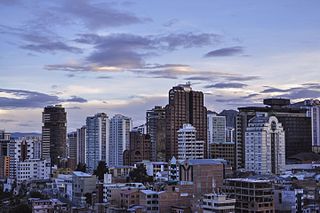
The economy of Bolivia is the 95th-largest economy in the world in nominal terms and the 87th-largest economy in terms of purchasing power parity. Bolivia is classified by the World Bank to be a lower middle income country. With a Human Development Index of 0.703, it is ranked 114th. Driven largely by its natural resources, Bolivia has become a region leader in measures of economic growth, fiscal stability and foreign reserves, although it remains a historically poor country.

Gonzalo Sánchez de Lozada Sánchez Bustamante, often referred to as Goni, is a Bolivian businessman and politician who served as the 61st president of Bolivia from 1993 to 1997 and from 2002 to 2003. A member of the Revolutionary Nationalist Movement (MNR), he previously served as minister of planning and coordination under Víctor Paz Estenssoro and succeeded him as the MNR's national chief in 1990.

The Bolivian gas conflict was a social confrontation in Bolivia reaching its peak in 2003, centering on the exploitation of the country's vast natural gas reserves. The expression can be extended to refer to the general conflict in Bolivia over the exploitation of gas resources, thus including the 2005 protests and the election of Evo Morales as president. Before these protests, Bolivia had seen a series of similar earlier protests during the Cochabamba protests of 2000, which were against the privatization of the municipal water supply.

Carlos Diego de Mesa Gisbert is a Bolivian historian, journalist, and politician who served as the 63rd president of Bolivia from 2003 to 2005. As an independent politician, he previously served as the 37th vice president of Bolivia from 2002 to 2003 under Gonzalo Sánchez de Lozada and was the international spokesman for Bolivia's lawsuit against Chile in the International Court of Justice from 2014 to 2018. A member of the Revolutionary Left Front, he has served as leader of Civic Community, the largest opposition parliamentary group in Bolivia, since 2018.
The Argentine energy crisis was a natural gas supply shortage experienced by Argentina in 2004. After the recession triggered by the Argentine economic crisis (1999-2002), Argentina's energy demands grew quickly as industry recovered, but extraction and transportation of natural gas, a cheap and relatively abundant fossil fuel, did not match the surge.

General elections were held in Bolivia on 18 December 2005. Evo Morales of the Movement for Socialism (MAS) party was elected President of Bolivia with 54% of the vote, the first time a candidate had received an absolute majority since the flawed 1978 elections. Morales was sworn in on 22 January 2006 for a five-year term. The MAS also won a majority of seats in the Chamber of Deputies and emerged as the largest party in the Senate.
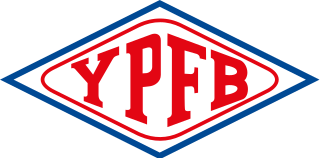
Yacimientos Petrolíferos Fiscales Bolivianos (YPFB) is a Bolivian state-owned enterprise dedicated to the exploration, exploitation, refining, industrialization, distribution and commercialization of oil, natural gas and derived products. It was created on December 21, 1936 under a government decree during the presidency of David Toro. YPFB is one of the biggest corporations in Bolivia.

The current Constitution of Bolivia came into effect on 7 February 2009 when it was promulgated by President Evo Morales, after being approved in a referendum with 90.24% participation. The referendum was held on 25 January 2009, with the constitution being approved by 61.43% of voters.
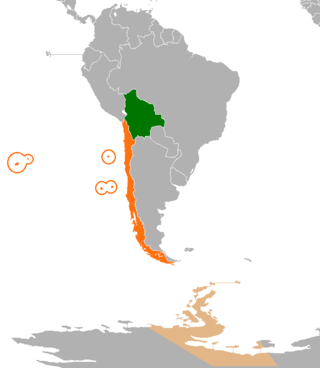
International relations between the Republic of Chile and the Plurinational State of Bolivia have been strained ever since independence in the early 19th century because of the Atacama border dispute. Relations soured even more after Bolivia lost its coast to Chile during the War of the Pacific and became a landlocked country. Chile and Bolivia have maintained only consular relations since 1978, when territorial negotiations failed and Bolivia decided to sever diplomatic relations with Chile. However, in spite of straining relationship, Chile and Bolivia still have economic treaties supporting tourism and cooperation; therefore, trading between two nations is not affected by the territorial dispute.
After the fall of Tiwanaku Empire, the many Aymara Lake Titicaca was conquered by the Inca Empire. Prior to the Spanish conquest, the Andean province of Qullasuyu was a part of the Inca empire, while the northern and eastern lowlands were inhabited by independent nomadic tribes. Spanish conquistadors, arriving from Cuzco and Asunción took control of the region in the 16th century. During most of the Spanish colonial rule, Bolivia was known as Upper Peru and administered by the Royal Audiencia of Charcas. After the 1st call for independence in 1809, 16 years of war followed before the establishment of the Bolivian Republic, named for the Liberator Simón Bolívar, on 6 August 1825. Since then Bolivia has endured regular periods of political and economic instability, including the loss of various provinces to its neighbors, such as Acre, parts of the Gran Chaco and its Pacific coast, making it a land-locked country.

The foreign policy of the Evo Morales administration concerns the policy initiatives made towards other states by the former President of Bolivia, in difference to past, or future, Bolivian foreign policy. Morales' foreign policy can be roughly divided between that of the Americas and the rest of the world.

The domestic policy of the Evo Morales administration refers to the domestic policy initiatives of the former President of Bolivia, including past pre-presidential advocacies by Morales.

General elections were held in Bolivia on 30 June 2002. As no candidate for the presidency received over 50% of the vote, the National Congress was required to elect a President. Gonzalo Sánchez de Lozada was elected with 84 votes to the 43 received by Evo Morales.

The history of Bolivia since 1982 begins with the restorations of democracy after the rule of the military junta of 1982. Evo Morales held the presidency from 2006 to 2019. A new constitution was enacted in 2009. Bolivia's population has roughly doubled over this period, from 5 million in 1980 to 10 million as of 2012.
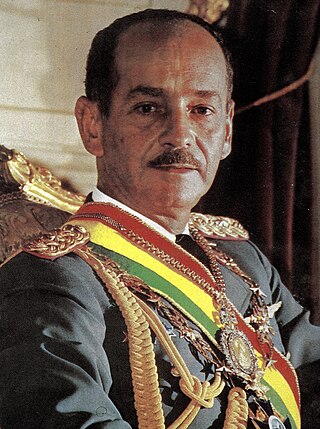
General elections were held in Bolivia on 1 June 1997. As no candidate for the presidency received over 50% of the vote, the National Congress was required to elect a president on 4 August. Hugo Banzer of Nationalist Democratic Action (ADN) was subsequently elected. Whilst the ADN emerged as the largest party in Congress, it failed to win a majority of seats, and formed a coalition government with the Revolutionary Left Movement, Conscience of Fatherland and the Civic Solidarity Union.
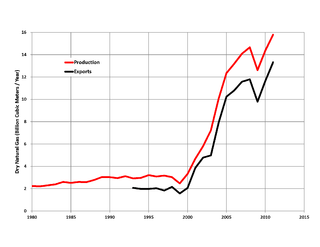
Natural gas in Bolivia is one of the nation's main energy sources and export products. Bolivia's proved natural gas reserves are estimated to be 10.7 (TCF) .. Most of these reserves are located in the eastern region of the country. The major export pipelines in Bolivia transport the gas to Argentina and Brazil.

General elections were held in Bolivia on 7 May 1989. As no candidate for the presidency received over 50% of the vote, the National Congress was required to elect a President on 6 August. Although the Revolutionary Nationalist Movement had received the most votes, its candidate for President Gonzalo Sánchez de Lozada was defeated by Jaime Paz Zamora of the Revolutionary Left Movement (MIR) in the Congressional vote, despite the MIR only finishing third in the public vote.

General elections were held in Bolivia on 6 June 1993. As no candidate for the presidency received over 50% of the vote, the National Congress was required to elect a president on 4 August. Gonzalo Sánchez de Lozada of the MNR-MRTKL alliance was subsequently elected unopposed.

The 2003 La Paz riots, commonly referred to as Black February, was a period of civil unrest in La Paz, Bolivia, that took place between 12 and 13 February 2003. The riots were instigated by the imposition of a progressive salary tax—dubbed the impuestazo—aimed at meeting the International Monetary Fund's goal of reducing the country's fiscal deficit from 8.7% of GDP to 5.5%. The legislation mobilized a diverse array of groups against the proposal, including business sectors, trade unions, and university students.